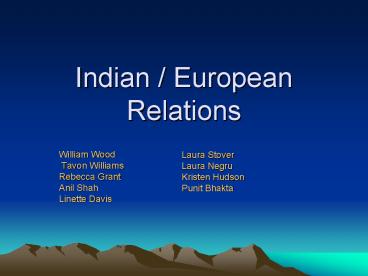Indian European Relations PowerPoint PPT Presentation
1 / 17
Title: Indian European Relations
1
Indian / European Relations
- William Wood
- Tavon Williams
- Rebecca Grant
- Anil Shah
- Linette Davis
Laura Stover Laura Negru Kristen Hudson Punit
Bhakta
2
INTRODUCTION
European Relations with the Indians will be
derived through the use of events including
trade, Indian culture, and the Pequot War. Trade
was an essential element for Europeans to
colonize in the New World. Indian culture
included European establishment in the New World
through the dedication of Teepee housing and
agriculture. The Pequot Indians were slaughtered
by the Europeans during the war due to conflicts
regarding trade and cultural differences. This
war was instrumental in the decline of the Indian
population.
3
THESIS
- The influences of European colonization on New
England Indian culture which led to the decline
and disbursement of Indian population.
4
METHODOLOGY
- Our thesis is supported by the following
documents Thomas Mortons Description of the
Indians in New England and Narratives of Pequot
War by John Mason and Lion Gardiner. We
synthesized these documents that make direct
correlations to the European influences on Indian
culture. Chapter three of Out of Many A History
of the American People by John Mack Faragher
provided information regarding cause and effects
of the European and Pequot conflict. These direct
accounts connected underlying concepts discovered
in books, periodicals, and internet sources
listed in the bibliography.
5
Thomas Morton Perceptions
- I have observed that the Salvages have the
sence of seeing so farre beyond any of our
Nation, that one would allmost believe they had
intelligence of the Devill sometimes, when they
have told us of a ship at Sea, which they have
seen sooner by one hour, yea, two hours sail,
then any English man that stood by of purpose to
looke out, their sight is so excellent. . . .
6
TRADE
- Of their Trafficke and Trade One With Another.
- Although these people have not the use of
navigation, whereby they may trafficke as other
nations, that are civilized, use to doe, yet doe
they barter for such commodities as they have,
and have a kinde of beads instead of money, to
buy withall such things as they want, which they
call Wampampeak wampum and it is of two sorts,
the one is white, the other is of a violet
coloure. These are made of the shells of fish.
The white with them is as silver with us the
other as our. gould and for these beads they buy
and fell, not only amongst themselves, but even
with us. - We have used to sell them any of our commodities
for this Wampumpeak, because we know we can have
beaver againe of them for it and these beads are
currant i.e. currency in all the parts of New
England, from one end of the coast to the other.
. . .
7
CUSTOMS
- Firing of the Country
- And this custom of firing the Country is the
meanes to make it passable and by that meanes
the trees growe here and there as in our parks
and makes the Country very beautifull and
commodious. And this custom of firing the Country
is the meanes to make it passable and by that
meanes the trees growe here and there as in our
parks and makes the Country very beautifull and
commodious. - For, when the fire is once kindled, it dilates
and spreads itself as well against, as with the
wind burning continually night and day, untill a
shower of rain falls to quench it.
8
CUSTOMS CONTINUED
- Houses and Habitations
- The Natives of New England are accustomed to
build them houses much like the wild Irish they
gather Poles in the woodes and put the great end
of them in the ground, placing them in forme of a
circle or circumference, and, bendinge the topps
of them in forme of an Arch, they bind them
together with the Barke of Walnut trees, which is
wondrous tough, so that they make the same round
on the Topp for the smoke of their fire to ascend
and pass through - They use not to winter and surnmer in one.place,
for that would be a reason to make fuel scarce
but, after the manner of the gentry of Civilized
natives, remove for their pleasures some times
to their hunting places, where they remaine
keeping good hospitality for that season
9
Native American Religious Beliefs
- Spirit based
- Good Spirit
- Bad Spirit
- Myth and Objects
- No written stories
- Belief in Sun, Earth, etc
10
RELIGION
- Although these Salvages are found to be without
Religion, Law, and King (as Sir William Alexander
hath well observed,) yet are they not altogether
without the knowledge of God (historically)
11
RELIGION
Jesuit missionary baptizing an Indian child.
12
Colonial Religions
13
Pequot War
- Major influx of European Settlers
- borders are penetrated
- Kinship systems
- European lifestyles and beliefs Indian Tribes
- Tribes
- Narrangansetts
- Mohegans
- Pequots
- Trade
- Initial trade agreements
- Wampum
- tributary agreements
- Dutch Strategy
14
Significant Events
- Pequots murder neighboring Indian tribe
- Dutch seek revenge
- Captain John Stone
- Mass. Bay-Pequot treaty
- 1636 2nd account of Stone's murder revealed in
Boston - Captain John Oldham
15
The War
- Aug 1636 John Endicott, John Underhill, William
Turner - Ft. Saybrook
- 1637 Pequots attempts to align with
Narrangansetts - Wethersfield
- May 1637
- Sept. 1638 Treaty of Hartford
16
Battles
17
CONCLUSION
- The events and conflicts through the 1600s
between the colonists and Indians was the start
of the downfall and scattering of the Indian
survivors which would later lead to the
absorption of the Indian tribes throughout the
South and the Midwest.

